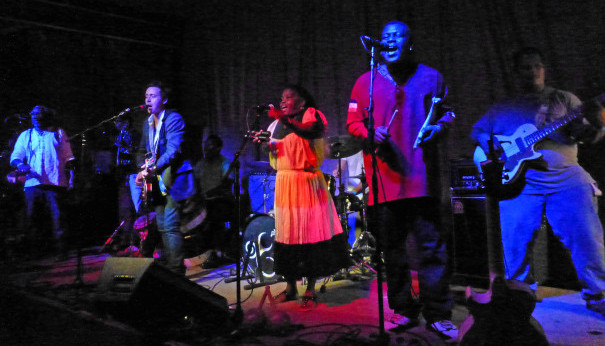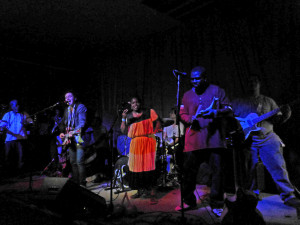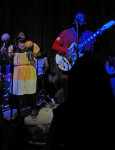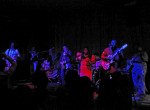Interview: Garifuna Collective keeps Belizean music alive

Garifuna Collective and Danny Michel perform at Brick and Mortar in San Francisco on Aug. 7, 2013. Roman Gokhman/STAFF.
Seven years after the death of its leader, the Garifuna Collective from Belize remains on track, with new recordings and a concert tour that brings the group to San Francisco this week.
The Garifuna Collective and Danny Michel
9 p.m., Aug. 7
Brick & Mortar Music Hall
Tickets: $15-$18.
Singer-songwriter Andy Palacio, Belize’s cultural ambassador to the world, worked tirelessly to teach others about his people, the Garifuna. Collaborating with producer Ivan Duran and recruiting Garifuna musicians from throughout Central America, in 2006 they released “Watina,” a powerful album of Afro-Caribbean folk and rock that topped world music charts and had the Garifuna Collective poised for international recognition.
Two years later, Palacio, at 47, died suddenly from a series of strokes, and Belize was stunned. His band didn’t have the luxury to pause.
“We were obviously shocked, but we had an entire tour that had already been booked,” says Duran, who runs Belize’s only recording studio. “When he died, we knew that we had to honor those commitments. So we made it a tribute tour.”
Today, the Collective has two new records: “Ayó” and “Black Birds Are Dancing Over Me,” an English-language collaboration with Canadian singer-songwriter Danny Michel. The group and Michel will play from all three at the Brick and Mortar club Wednesday.
“We were very conscious that the door that Andy had opened, we couldn’t let it shut,” says Duran, who produced and performed on the new albums. “If we would have canceled that tour [in 2008], it probably would have been the last tour. We had this huge responsibility.”
The Garifuna race was born in 1635 when two slave ships sank off the island of St. Vincent in the Caribbean. Survivors settled the island, marrying locals. In 1797, British conquered St. Vincent and shipped the Garifuna to Roatan Island, Honduras. Some migrated to the mainland and settled in Honduras, Belize, Guatemala and Nicaragua.
Palacio made it his mission to help the Garifuna people, who were losing their identity to modern times, appreciate their culture.
The Collective has a new goal with “Ayó,” which means goodbye. While the band reaches back to its roots, the music isn’t traditional Garifuna folk.
“I think we passed that point where we had to show people where on the map we were,” Duran says. “We [are now] developing the music and showing the world it is a very interesting living culture. It may not be your regular pop or reggae music, but for Belize, it’s … not something that you go into the village to hear.”
The 2013 tour finds the Collective traveling the world again, without a frontman.
“To me, it’s a much more beautiful thing because … this culture was built on community,” Duran says.
- Garifuna Collective and Danny Michel perform at Brick and Mortar in San Francisco on Aug. 7, 2013.
- Garifuna Collective and Danny Michel perform at Brick and Mortar in San Francisco on Aug. 7, 2013.
- Garifuna Collective and Danny Michel perform at Brick and Mortar in San Francisco on Aug. 7, 2013.
Follow editor Roman Gokhman at Twitter.com/RomiTheWriter.




